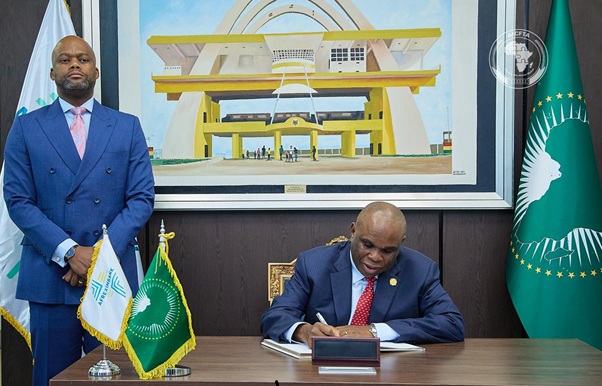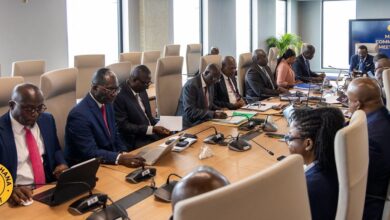Afreximbank Revives Export Trading Model to Boost Intra-African Trade and Global Market Reach

President and Chairman of the Board of the African Export-Import Bank (Afreximbank), Prof. Benedict Oramah, says the Bank is reviving the model of Export Trading Companies (ETCs) to help African producers expand beyond domestic markets and gain stronger footholds in global trade.
Delivering a lecture during his farewell visit to the African Continental Free Trade Area (AfCFTA) Secretariat in Accra, Prof. Oramah outlined Afreximbank’s renewed commitment to bridging Africa’s trade competitiveness gap through financing, infrastructure, knowledge, and policy harmonization.
“Our approach is holistic,” he explained. “We need financing for traders and industrialists, infrastructure like rails and payment systems, knowledge platforms such as trade fairs and information portals, and policy support to harmonize regulations. Afreximbank, working closely with the African Union, AfCFTA Secretariat, national governments, and the private sector, is delivering on all these fronts.”
Prof. Oramah said the Bank is actively developing testing and certification infrastructure across Africa to ensure that every country has the capacity to verify the quality and standards of tradable goods. This, he noted, is essential for Africa to compete effectively within the AfCFTA and globally.
He emphasized that Afreximbank’s efforts go beyond providing capital—“it is about building the ecosystem for trade.” The revival of Export Trading Companies, he added, would help consolidate products from small producers, provide logistics and market intelligence, and enhance access to export markets.
“The AfCFTA is often compared to the European Common Market of the 1950s or the ASEAN Free Trade Area of the 1990s,” Prof. Oramah said. “But in truth, it is even more groundbreaking given Africa’s diversity and the number of nations involved. If we succeed, Africa will move from a collection of mostly small economies to a single economic bloc with the potential to rival other major regions.”
He described Afreximbank’s partnership with the AfCFTA Secretariat as a model for how a financial institution can directly underpin a continental policy initiative—one that could be replicated across other critical sectors where Africa seeks greater self-determination.
However, Prof. Oramah cautioned that success would require collective responsibility across multiple stakeholders. “Customs officials must implement new rules diligently, regulators must cooperate across borders, banks must extend credit, businesses must innovate and take risks, and governments must resist protectionist reflexes when challenges arise,” he urged.




